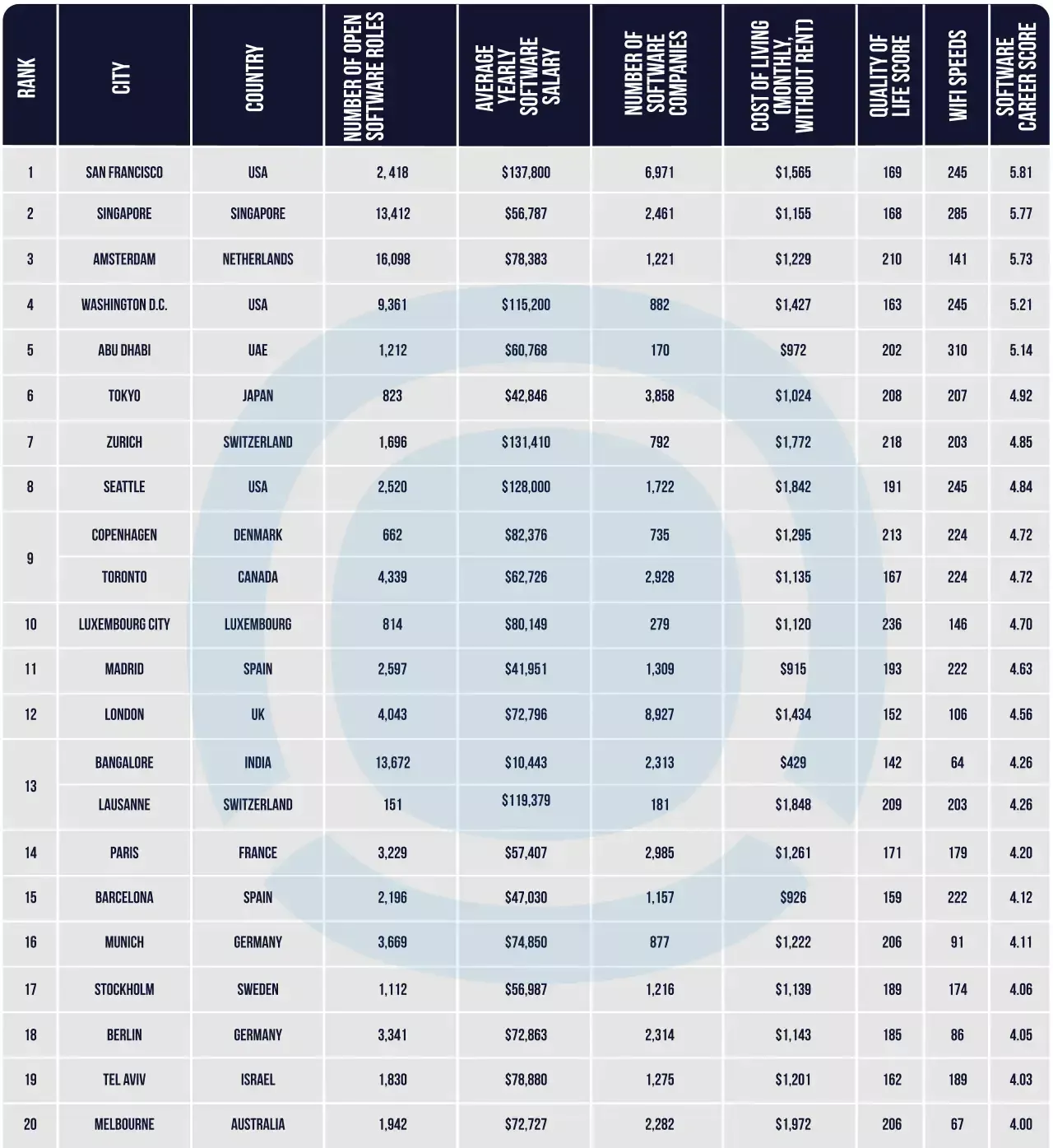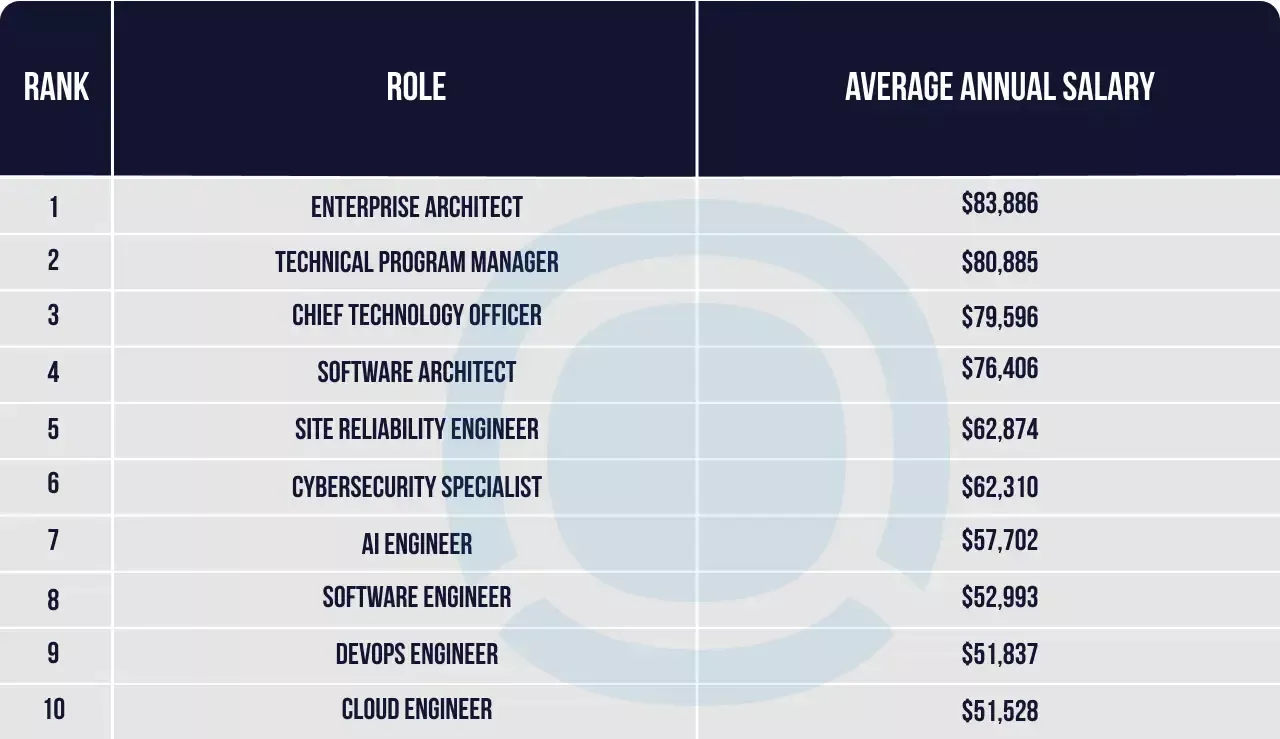Interviews & Editorials
The Best Cities for a Career in Software

- Top 20 global cities for a software career
- The most lucrative software roles
-
How can businesses attract the best software talent?
- 1. Host developer-centric events
- 2. Engage on developer platforms (GitHub, Stack Overflow)
- 3. Offer “reverse interviews”
- 4. Build an internal developer evangelist
- 5. Create a ‘sandbox environment’ for candidates
- 6. Showcase real tech problems in job descriptions
- 7. Equity with a real impact
- 8. Work on public-facing projects
- Sources and methodology
In the tech world, one thing is certain: software professionals are always on their toes, adapting and evolving as quickly as the technology they work with. And with the world becoming more reliant on technology, there is more need for these professionals than ever before.
The industry is set to grow 11% in the next decade, driving demand for talent, especially in fields like iGaming and virtual reality. If you're in tech, you already know that the demand for software professionals is skyrocketing. But where’s the best place to kick off or grow your software career?
In light of these trends, we’ve dug into the data to identify the best cities worldwide for software careers and the most lucrative roles in the industry. We looked at factors like the number of open software positions, salaries, the concentration of software companies, cost of living, quality of life, and Wi-Fi speeds.
Whether you’re a seasoned software professional or just starting out, these are the locations worth considering for your career.
Top 20 global cities for a software career #

1. San Francisco, United States #
When it comes to software careers, San Francisco is still the place to be. Right next to Silicon Valley, it’s a home to thousands of the world’s top tech companies, including big names like Google, Apple, and Facebook. The sheer number of opportunities for software professionals is impressive—nearly 7,000 companies—but so is the competition.
With high salaries averaging $137,800 a year, it’s also one of the most lucrative places for tech professionals. However, the cost of living is notoriously high, with monthly expenses averaging $1,565, excluding rent. That’s why standing out with the right skills and experience is crucial if you want to land a top role in this competitive city.
2. Singapore, Singapore #
Singapore is a growing tech hub, and it’s quickly becoming a top destination for software professionals. With over 13,400 job openings, Singapore’s job market is thriving. What makes it even more attractive is the impressive broadband speed (285 Mbps), the second fastest from our research.
It’s not as expensive as San Francisco either, with a lower cost of living and competitive salaries averaging $56,787. If you’re looking to work in an up-and-coming city that offers both opportunity and affordability, Singapore is worth considering.
3. Amsterdam, The Netherlands #
If you’re after a city that offers not just great job opportunities but a high quality of life, Amsterdam should be on your list. It ranks third overall, with over 16,000 open software roles and a well-established tech scene.
Amsterdam’s reputation for work-life balance and cultural diversity makes it an appealing destination for professionals. The cost of living is more reasonable than some other cities, and you can expect an average salary of $78,383.
4. Washington D.C., United States #
While Washington D.C. may not be the first city that comes to mind for tech, it’s rapidly growing as a hub for software professionals. With over 9,000 open roles and an average salary of $115,200, the city is making a name for itself in the tech world.
And it’s not just the job market that’s growing—D.C. also offers a solid quality of life and competitive Wi-Fi speeds. It’s a good all-around option for those looking to advance their careers.
5. Abu Dhabi, United Arab Emirates #
Abu Dhabi is investing heavily in its tech sector, and it shows. The city offers incredible broadband speeds (310 Mbps - the fastest on our list) and a relatively low cost of living ($972 per month), making it an attractive destination for software professionals. The average salary is $60,768, and with a strong quality of life score (202), Abu Dhabi is a city on the rise for tech talent.
The most lucrative software roles #
If salary is your top priority, certain software roles offer more earning potential than others. Based on our analysis of average salaries across five different countries, here are the highest-paying software roles:

Enterprise Architect #
Enterprise Architects earn top dollar in the software world, with an average salary of $83,886. They’re responsible for designing and overseeing complex IT systems that align with the business’s strategic goals, making this role critical to any tech-driven organization.
Technical Program Manager #
Technical Program Managers ensure that engineering teams are aligned with business objectives, overseeing the successful delivery of products on time and within budget. These roles are especially valuable in large tech companies and fast-growing startups, with salaries averaging $80,885.
Chief Technology Officer #
CTOs oversee a company’s technical infrastructure and strategy, making sure that technology investments align with business goals. In larger organizations, this role is often shared with a CIO, but smaller companies usually rely on the CTO to handle all things tech. The average salary for CTOs is around $79,596.
Software Engineer #
Software engineers might not hold the highest salary in tech, with an average of $76,406 per year, but they make up for it in sheer demand and impact. From developing systems for finance and healthcare to building the technology behind sportsbook software, e-commerce platforms, and even entertainment apps, their work touches almost every aspect of our digital lives. It’s a creative, problem-solving career that keeps evolving as technology advances—no wonder this role gets Googled a whopping 450,000 times each month!
How can businesses attract the best software talent? #
If you’re leading a team or scaling your tech department, finding top-tier talent is crucial. Beyond competitive salaries, companies need to create environments that attract the best in the business. Here’s some advice from our HR Director with over a decade in the industry, Ivana Perković, on how to stand out in a crowded market:
1. Host developer-centric events #
Sponsor or organize hackathons or niche tech meetups in your space. This puts your company directly in front of top talent, especially those passionate about coding challenges. Make sure you follow up with participants personally—this isn’t just a branding exercise, it’s direct recruitment.
2. Engage on developer platforms (GitHub, Stack Overflow) #
Actively contribute to open-source projects or engage with top contributors on GitHub and Stack Overflow. If your company builds something that developers can respect, they’ll be far more inclined to join. Plus, it gives you a direct view of their work before you reach out.
3. Offer “reverse interviews” #
Let candidates interview you first. Give them direct access to the team, CTO, or even customers to ask candid questions. Transparency like this attracts A-level talent because it builds trust right from the start.
4. Build an internal developer evangelist #
Instead of having just a recruiter or HR manage hiring, have a well-known developer or tech lead in your company promote your tech stack and culture on social platforms. Engineers are more likely to trust technical people than a job description written by non-developers.
5. Create a ‘sandbox environment’ for candidates #
Let prospective hires try out your environment for a week or two, paid. They’ll get a feel for your team, tools, and culture, and you’ll see their skills in action. This weeds out anyone who isn’t up for the challenge without wasting time on long hiring processes.
6. Showcase real tech problems in job descriptions #
Don’t write generic “we’re looking for a passionate developer” descriptions. Include actual problems you’re working on or exciting tech challenges you need to solve. Talented devs love a tough problem, so get specific about the hurdles they could tackle.
7. Equity with a real impact #
Instead of offering token equity that doesn’t mean much, explain how your options are structured in a way that genuinely impacts their financial future. Break down how this has benefited past employees—numbers matter more than vague promises.
8. Work on public-facing projects #
Engineers want to work on projects they’re proud of. If you have something that’s high-visibility, showcase that. If you don’t, start building projects that matter—top engineers won’t stick around for another CRUD app.
Sources and methodology #
To find out which cities were the best in the world for a software career, we created a seedlist of 30 popular cities known for their involvement in the technology industry. We then analysed the following metrics for each city:
The number of open software job roles - Glassdoor
The number of software companies - Crunchbase
Quality of life score - Numbeo
Broadband wifi speeds - Speedtest.net
Cost of living (monthly, without rent) - Numbeo
Average salaries - Glassdoor
To find out which were the most lucrative software job roles, we looked at the 15 most searched for software jobs on Google. We then analysed the average salary per role across the UK, USA, South Africa, Brazil and Italy. A total average was then calculated based on these figures.
Tags:
Related Articles
News
29.04.2025.
NSoft and InnovaPlay Strategic Partnership
The strategic collaboration integrates NSoft’s innovative sportsbook technology seamlessly into InnovaPlay’s comprehensive white-label and full web solution, empowering sportsbook operators to reach new heights of performance and player engagement.
Learn more
News / Interviews & Editorials
16.04.2025.
Beyond the Bet: How Gamification is Reshaping Online Gambling
By making the gamification elements fun, relevant, and optional, you ensure that they enhance the betting experience rather than overshadow it.
By Marko Galić, Game Mathematician & Project Manager at NSoft
Learn more
News / Interviews & Editorials
08.04.2025.
The Formula One Race Report
Attending a Formula One Grand Prix is a bucket-list experience for many motorsport fans but while the roar of the engines and the glamour of race days are undeniably exciting, the cost of attending is a luxury few can regularly afford.
We break down the true cost of attending a race weekend this season, ranking Grand Prix events. So which one offers the best value for money?
Learn more
Didn’t Find What You’re Looking For?
Our team will be happy to guide you through our products and services.
Contact us